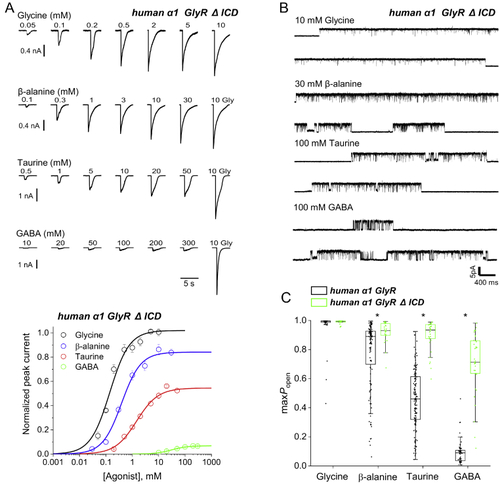
Removing the ICD loop from the human α1 GlyR increases agonist efficacy.A, upper panel, whole cell current responses to U-tube application of glycine, β-alanine, taurine and GABA to HEK 293 cells expressing human α1 GlyR Δ ICD. A, lower panel. Averaged concentration-response curves to glycine (black), β-alanine (blue), taurine (red) and GABA (green) on human α1 GlyR Δ ICD. Each curve is constructed from pooling individual concentration-response curves obtained in different cells (n = 4-6, see Table 1). Error bars represent S.E. Responses are normalised to the response to 10 mm glycine in each cell. B, cell-attached recordings of clusters of single-channel activity evoked in human α1 Δ ICD by saturating agonist concentrations (10 mm glycine, 30 mmβ-alanine, 100 mm taurine, 100 mm GABA). C, boxplot of maximum Popen values produced by at saturating agonist concentrations for human α1 GlyR (black, left hand side in each pair) and human α1 GlyR ΔICD (green, right hand side in each pair). Each point is the Popen value from a cluster of single-channel activity. Boxes and whiskers show the 25th and 75th percentiles and the furthest points that fall within 1.5 times of the interquartile range from the 25th to 75th percentiles, respectively. The horizontal line in the box is the median. Asterisks denote significant differences in randomization tests (two tail, unpaired; 10000 iterations; p < 0.005).
|